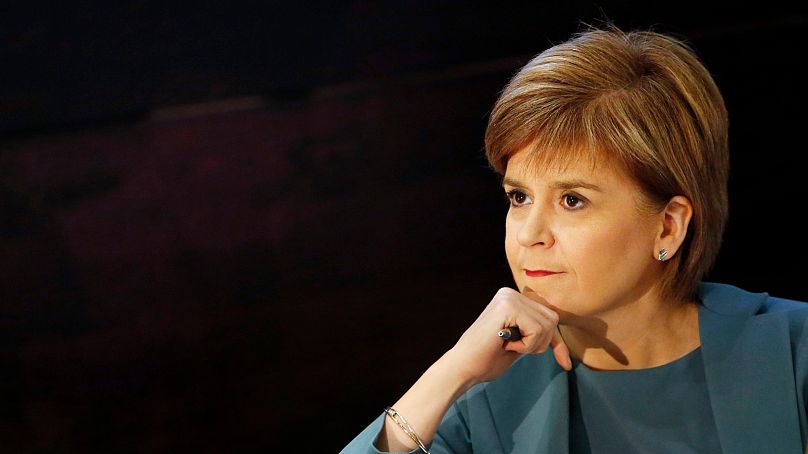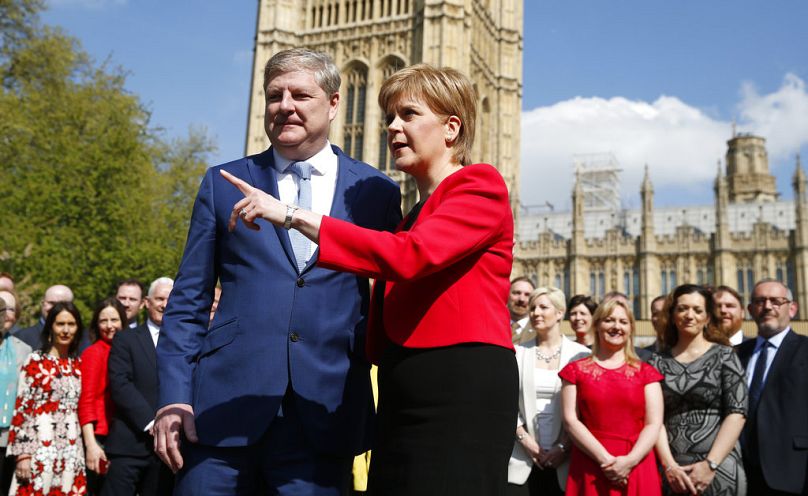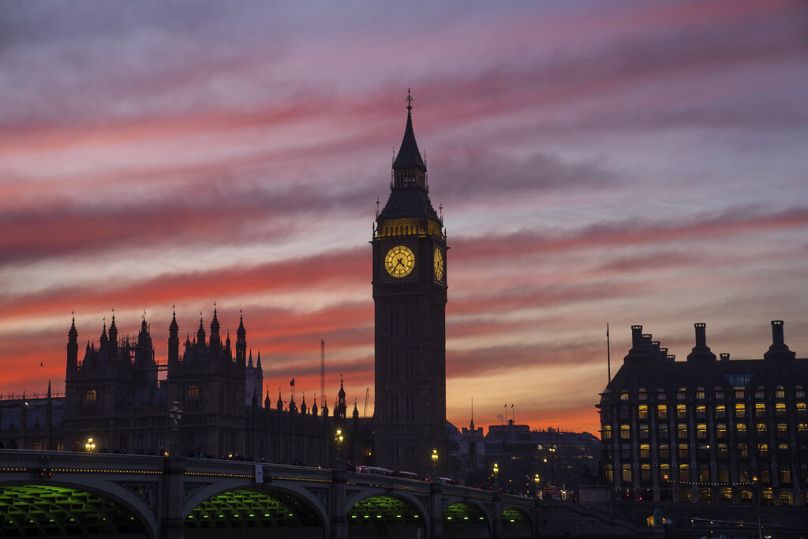There are several reasons why Scotland's longest-serving First Minister is stepping down, and more than a few likely contenders for her job.
Scotland's First Minister Nicola Sturgeon announced her decision to leave the nation's top job on Wednesday, not after an election defeat or an embarrassing scandal, but at a moment that was right for her.
 ADVERTISEMENT
ADVERTISEMENT
 ADVERTISEMENT
ADVERTISEMENT
Until just one day before, Sturgeon said, she was only 99% certain she would go through with it, but conceded that she could have only continued a few more months, if that.
So why has she decided, now, to step down? After eight years in the job (and another seven as deputy first minister before that), Nicola Sturgeon owes nothing to Scottish politics, her party, or the independence movement.
But the time had come, she told journalists at a hastily-arranged press conference in Edinburgh, to consider whether carrying on as first minister was right for her, or for the country.
"If this was just a question of my ability, or my resilience to get through the latest period of pressure I wouldn't be standing here today, but it's not. This decision comes from a deeper and longer-term assessment," she said.
"Giving absolutely everything of yourself to this job is the only way to do it. The country deserves nothing less. But in truth that can only be done by anyone for so long. For me, it is now in danger of becoming too long."
Sturgeon said she was never off duty, and had "virtually no privacy", explaining that it was "very difficult" to go for a walk or meet friends for coffee. She described the "brutality" of being a politician, and how it has taken a toll on herself and the people around her.
Former SNP MP Stephen Gethins, now a Professor of Practice at Scotland's University of St Andrew's, told Euronews that Nicola Sturgeon leaves behind a "very positive legacy."
"If you think she was first minister through some of the most tumultuous periods in British politics full stop. In the aftermath of the independence referendum, SNP membership surged. She saw support for independence increase significantly, and more than that, in the big challenging issues of the day she was one of the only UK leaders to come out of the Brexit debacle with any kind of credibility," he said.
Sturgeon's handling of the COVID pandemic, Gethins said, showed "leadership during a tragedy that impacted households across Scotland and across the world."
At her Wednesday lunchtime speech, Nicola Sturgeon did stress that resigning was something she had thought about more seriously over the last few weeks and wasn't a reaction to short-term political problems.
Opponents will have raised an eyebrow at this: Sturgeon became a lightning rod for gender-critical groups, including Harry Potter author JK Rowling, as parliament debated, then overwhelmingly passed, a new law on rights for trans people in December.
After that, a new row erupted over a trans woman who was to be put in a women's prison -- even though she had raped two women before she transitioned.
There's also an ongoing police investigation into possible fundraising fraud at the SNP, where Sturgeon's husband Peter Murrell is the party's chief executive.
Failure to deliver on improving the health service, upgrade a major road in the Highlands, or even bring in a bottle and can recycling scheme have bedevilled her administration of late.
But it's been her decision to turn the next UK general election into a de facto referendum on independence that has split the Scottish voting public and even members of her party who would otherwise be closely aligned with her policies.
Sturgeon has recognised, wisely, that her personal position on the issues, and how polarising she is in Scotland where people either love her or loathe her, could be a barrier to engaging more people in the conversation about independence.
"Polarisation in politics is not just a problem in Scotland, but across the democratic world," said Stephen Gethins.
"A quick glance at social media shows you the toxicity towards the first minister, even on the day of her resignation, is still there. And regardless of how people vote and the parties they back we all need to take seriously the way we engage in public discourse, even with people who don't share our views," he said.
Who might replace Nicola Sturgeon?
When Scotland's previous first minister stepped down after the failed 2014 independence bid, Nicola Sturgeon was the obvious successor.
Now that Sturgeon is stepping down the situation is different, with no clear heir to the keys of Bute House -- the Scottish equivalent of Number 10 Downing Street.
So who might lead Scotland forward towards another independence referendum?
Deputy First Minister John Swinney was a previous SNP leader in the early 2000s, and has a huge amount of respect within the party and at the Scottish Parliament in Holyrood. However at age 58 he might be seen more of a caretaker if he became first minister, waiting for generational change to come along.
Finance Secretary Kate Forbes is on maternity leave at the moment, and at 32 she would be the youngest-ever Scottish first minister if she landed the job. A member of the austere Free Church of Scotland, Gaelic-speaker Forbes is more socially conservative than Sturgeon on issues like trans, abortion, and LGBT rights.
Former journalist Angus Robertson is Scotland's foreign minister and very much a Sturgeon ally. He speaks fluent German -- his mother is German -- and he's staunchly pro-European. He previously held the role of the SNP's leader at Westminster so has had plenty of exposure on the national political stage. While Robertson's political opponents within the SNP have been critical of some of his economic ideas, they will grudgingly admit he'd be a thoroughly safe pick for Scotland's top job.
Humza Yousaf is Scotland's health secretary, and ambitious enough to want to be first minister. He would be the first person in the position with an immigrant background -- his family comes from Pakistan -- and is already the first ethnic minority and Muslim cabinet secretary. However, Yousaf has weathered sustained criticism about his handling of the National Health Service in Scotland and opponents would have an endless stream of negative stories to hit him with, so he is likely to be too much of a liability to become first minister at this point.
What about Westminster politicians?
Under the SNP's own rules, the party leader must be a Member of the Scottish Parliament in Edinburgh and not a Member of Parliament at Westminster.
So any London-based MPs would need to find a seat in Scotland and win it first before making a move to be party leader, and that rules out, for now, the new SNP Westminster leader Stephen Flynn -- who has performed strongly at Prime Minister's Questions since being elected.
It also rules out the party's fiery deputy Westminster leader Mhairi Black who can always be counted on for a rousing speech in the chamber, and it rules out too MP Joanna Cherry who in many ways is the antithesis of Nicola Sturgeon but who doesn't command much support (nor have many political friends) in either Westminster or Holyrood.
Dark horse candidates - names to watch in the future
As for a couple of dark horse candidates: Fife MSP Jenny Gilruth, a former high school teacher, holds the transport portfolio in government.
She certainly has the ambition and competence to be Scotland's first minister (and is married to the ex-leader of the Scottish Labour Party, so presumably knows how to make political compromises!) so it would be a matter of whether or not she wants to throw her hat in the ring.
Meanwhile, Europe Minister Neil Gray is much-liked by the Consular Corps in Scotland who see him as a sure pair of hands and a skilled operator.
The timing and political machinations might not work for Gilruth or Gray right now, and they would both be wildcard outsiders to pick up a win -- but in politics, you can never count out a dark horse candidate.













